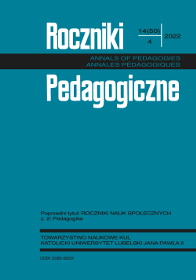Opportunities and Threats in the Parenting Process in a Patchwork Family: Study of a Reconstructed Family
Main Article Content
Abstract
Both in Poland and in the world, a common phenomenon is the growing percentage of step families, in the literature on this subject also called blended families. Such a family model consists of a couple of adults bringing up children of a partner from a previous relationship, a common child as well as a biological parent who functions outside the basic family system on a daily basis. In the process of creating a blended family there is not only the merging of different people, but also their beliefs, habits and experiences that they bring into this new relationship. Building a cohesive blended family is a long and demanding process. Besides analysing many risks and difficulties, it is undoubtedly necessary to look at how such a family arrangement teaches tolerance and responsibility. This article will present the results of a part of research whose main aim was to get to know family relations and educational interactions in the examined banded families from the point of view of individual members of these complex systems. The research was conducted in the strategy of qualitative research in the interpretative paradigm, using the method of individual cases. On the example of the family of Mr. and Mrs. M., the strengths and weaknesses of upbringing interactions in a blended family were discussed.
Article Details
References
Coleman, M., Fine, M.A., Ganong, L.H., Downs, K., & Pauk, N. (2001). When you’re not the Brady Bunch: Identifying perceived conflicts and resolution strategies in stepfamilies. Personal Relationships, 8, 55-73.
Coleman, M., Ganong, L., & Fine, M. (2000). Reinvestigating remarriage: Another decade of progress. Journal of Marriage and the Family, 62(4), 1288-1307.
Burkacka, I. (2017). Monoparentalność, wielorodzina i rodzina zrekonstruowana. Współczesne nazwy modeli życia rodzinnego. Artes Humanae, 2, 61-94.
Dobkowska, D. (1984). Więź uczuciowa w rodzinie zrekonstruowanej. W: L. Wołoszynowa (red.) Materiały do nauczania psychologii. Psychologia rozwojowa, wychowawcza i społeczna. T. 11 (s. 363-464). Warszawa: Wydawnictwo Naukowe PWN.
Francuz, G. (1986). Psychologiczna analiza relacji zachodzących w rodzinach zrekonstruowanych. Roczniki Filozoficzne, 39(4), 87-102.
Ganong, L.H., & Coleman, M. (1994). Remarried family relationships (SAGE series on close relationships). SAGE Publications.
Golish, T.G. (2003). Stepfamily Communication Strengths: Understanding the Ties That Bind. Human Communication Research, 29(1), 41-80.
Hetherington, E.M. (1999). Family functioning and the adjustment of adolescent siblings in diverse types of families. Monographs of the Society for Research in Child Development, 64(4), 1-25.
Hetherington, E.M., & Henderson, S.H. (1997). Fathers in stepfamilies. W: M. Lamb (red.), The Role of the Father in Child Development (s. 212-226). New York: John Wiley & Sons.
Kwak, A. (1990). Więź osobowa w rodzinach rekonstruowanych, Warszawa: Uniwersytet Warszawski.
Lewandowska-Walter, A. (2014). Rodzina zrekonstruowana. W: I. Janicka, H. Liberska (red.), Psychologia rodziny. Warszawa: Wydawnictwo Naukowe PWN.
Lewandwoska-Walter, A., Błażek, M. (2018). Test Relacji Rodzinnych. Gdańsk: Pracownia Testów Psychologicznych i Pedagogicznych.
Margasiński, A. (2013). Skale Oceny Rodziny. Polska adaptacja FACES IV – Flexibility and Cohesion Evaluation Scales Davida H. Olsona. Warszawa: Pracownia Testów Psychologicznych Polskiego Towarzystwa Psychologicznego.
Matczak, A., Jaworowska, A. (2017). Test Kompetencji Rodzicielskich. Warszawa: Pracownia Testów Psychologicznych Polskiego Towarzystwa Psychologicznego.
Olson, D.H. (2013). Kwestionariusz FACES IV i Model Kołowy: badania walidacyjne. Warszawa: Pracownia Testów Psychologicznych Polskiego Towarzystwa Psychologicznego.
Plopa, M. (2008). Skala Postaw Rodzicielskich. Wersja dla rodziców. Warszawa: Vizja Press & It.
Plopa, M. (2012). Skala Postaw Rodzicielskich - 2. Rodzice a młodzież. Warszawa: Vizja Press & It.

